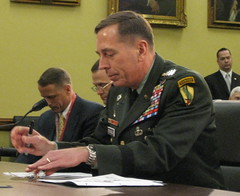By Michael Ruhl, University of New Mexico – Talk Radio News Service
According to General David Petraeus, an educated American soldier that can bridge the cultural divide with the Muslim world can more effectively fight the War on Terror. This soldier would understand the social context they are operating within, and would understand the broad implications and consequences of military action.
General Petraeus, Commander of U.S. Central Command, discussed U.S. military strategy in the Middle East and South Asia while testifying today before Congress.
“While additional military forces clearly are necessary (in Afghanistan), they will not by themselves be sufficient to achieve our objective,” said the General. America’s objective, he said, is to make sure extremists do not have a haven from which to plan and execute another attack on the level of the 9-11 attacks.
A smarter military can better understand the necessary social infrastructure to facilitate lasting peace within a region. This combined with intelligent military action, international cooperation, the building of infrastructure and a swath of other initiatives will help America secure the region, according to Petraeus. “You cannot kill or capture your way out of an industrial strength insurgency,” the General said.
"We also need to expand just the basic knowledge of Afghanistan among our forces," Petraeus said. He continued that greater knowledge will lead to a "nuanced and granular understanding" that will enable the Army to undertake the kind of sophisticated reconciliation processes in Afghanistan that were important in Iraq.
Congressman Norm Dicks (D-Wash.) agreed that soldiers should be educated, and brought attention to the U.S. Army’s Homestead Program. Dicks said this program involves an Officer taking a year off from active service to live in a country, learn the language, and understand the culture. Retired Army General John Abizaid did a program similar to this. Abizaid was former Commander of U.S. Central Command.
The U.S. Army could not be reached for comment on the current funding of the program, but Dicks expressed concern on the small number of individuals enrolled in it.
The necessary approach to success involves placing security in the hands of the Afghans, Petraeus said, which means helping them collectively realize that the biggest security threat in the region comes from dissident extremist elements within the country, most notably Al-Qaeda. He emphasized that America’s presence in Afghanistan is not permanent, and that Afghanistan’s government and economy must be encouraged by its citizens.
